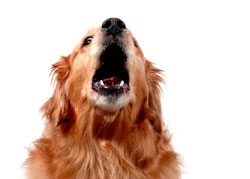DogBreeds Info
Information on Dog Breeds from Ato Z
|
How to Get Your Dog to StopBarking
All dogs, every single one enjoys barking. It is a part of who they are, and if it only occurs on rare occasions, then you do not have one of those dogs that barks and needs training. Most dogs bark because they need something, be that taken outside or fed. Some canines are even bred from birth to bark, so ensure you do not have one of those types of dogs before you begin to train it not to bark as it may become defensive. Some dogs do it just to warn their wonderful owner, that there is some form of danger present or another animal leering.
Once you have defined the reason for the barking, do not be one of those owners that gives into the barking by providing a treat of any kind as this will do nothing but entice them to continue doing it to get their way. Much like a child having a temper tantrum of any kind, you do not want to treat this type of barking behavior. Instead, many trainers have suggested providing a time out zone for a dog to train in just as a child’s quiet spot to be placed in for a time out. The dog is to go to their time out zone for a few minutes until they cool off. Always provide some area in the home for the dog to rest peacefully. Some animals act up when the owner is not home just as a child would left unattended as a form of anxiety due to being left alone. If you leave the dog a cozy bed or area with a blanket inside or out of a cage even for them to go to when it is time to rest, they will go to that comfort zone when you are not home to ensure they are not barking up a storm while you are at work all day long.
Some other helpful hints for training a dog not to bark as often are to supply them with ample things to play with during the day as well and also to look into any collars that can aide in barking. Citronella collars are becoming quite popular as they are safe and effective at calming the dog to prevent the barking from escalading. Toys for the dog to chew on and play with to occupy themselves are a great idea, bones or squeaky ones any type of toy you know your dog enjoys that isn’t your favorite pair of shoes! Always praise your dog or puppy when they have done something good or correct during their training weeks to ensure you are equally balancing their behavior.
Related Articles Reasons to Choose Organic Dog Food 5 Common Household Toxins and Your Dog The Best Dogs for Senior Citizens Pros and Cons for Neutering or Spaying YourDog Basic Principals for Better Health andSafety of Dogs 5 Ways To Keep Your Dog Healthy and Safe How to Avoid Dehydration for Dogs How to Choose A Dog That's Right For You How to Get Your Dog to Stop Barking How To Avoid Worms In Your Dog Poisons To Keep Away From Your Dog Safety Dogs for Autistic Children Should You Buy From A Puppy Mill? Teaching Your Dog To Speak, Not Bark Buying a Dog From a Rescue: What To Look OutFor How to Puppy Proof Your Home5 Common Household Toxins and Your Dog 5 Tips For Dog Show Preparation Clipping Dog Nails: A How To Guide Children and Dogs: Is your Child Ready For aDog? Dogs and Fleas: How to Treat Your Dog'sFleas 5 Ways To Exercise With Your Dog Brushing Dog Teeth: A How To Guide Overweight Dog? The Doggy Diet 5 Useful Tips For Dog Paw Care When To Euthanize Your Dog: Making TheDecision How to Stop Your Dog From Jumping 5 Tips To Managing Shedding Dogs Where You Should Look to Find Your Puppy Three Main Keys to Owning a Healthy and HappyDog Dog First Aid: How To Treat Woundsand the Supplies You Need The Options for Paying Those Costly VetBills Tips to Maintain a Healthy Dog or Puppy forLife Things to Consider Before Buying a Puppy Useful Information for Dog Breeding Training Your Dog to Walk with a Leash Most Popular Dog and Puppy Names of 2011 Dealing with your Dog's Sleeping Habits Why You Really Shouldn't Feed Your DogScraps Why Don't Some Dogs Like Strangers? To Breed for the AKC Standards or Not Why You Should Check for Corn in Your DogFood Dealing With Your Dog's Ear Infection Shock Collars and Electric Dog Fences Foods to Keep Away From Your Dog Should You Feed Your Dog a Raw Food Diet? Calming Your Dog Around Thunder Things to Consider When Moving While Owning aDog Why You Should Get Your Dog Fixed Learning to Live With a Dog When You Don'tWant To What to Do if You Are Attacked By a Dog |
|
Copyright 2010. All Rights Reserved.
www.dogbreedsinfo.org
 No matter how much you simply adore your dog, when it barks uncontrollably it can be a nuisance. Perhaps your dog barks just for attention, or when company comes to the door? Either way, they are doing it for a reason and the sooner you comprehend why they are barking, the sooner you will understand how to treat it and prevent your dog from barking so often.
No matter how much you simply adore your dog, when it barks uncontrollably it can be a nuisance. Perhaps your dog barks just for attention, or when company comes to the door? Either way, they are doing it for a reason and the sooner you comprehend why they are barking, the sooner you will understand how to treat it and prevent your dog from barking so often.